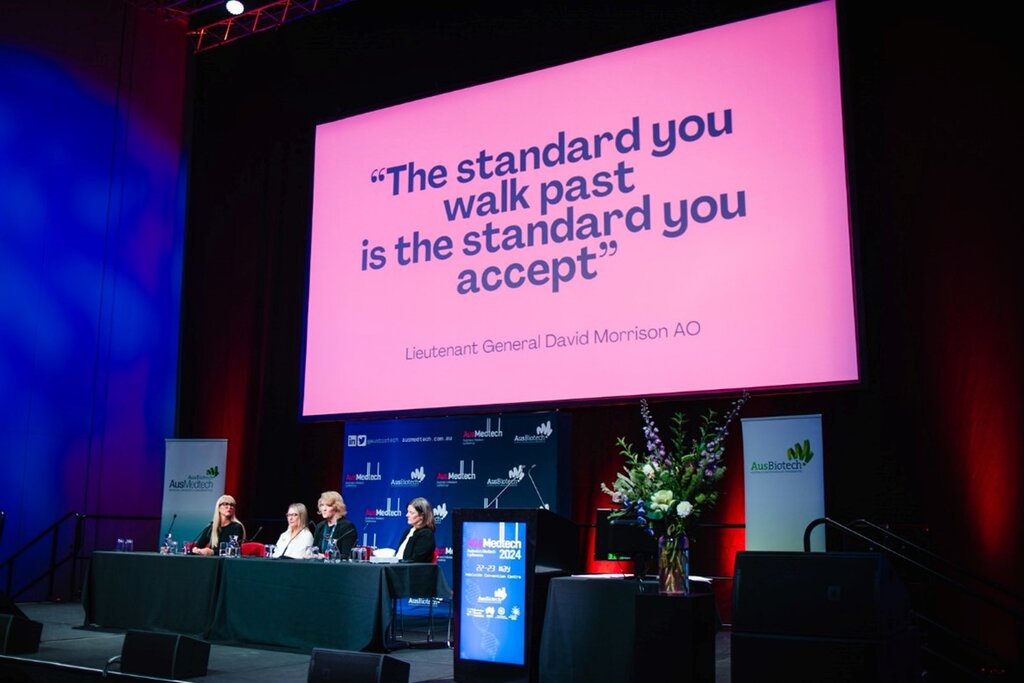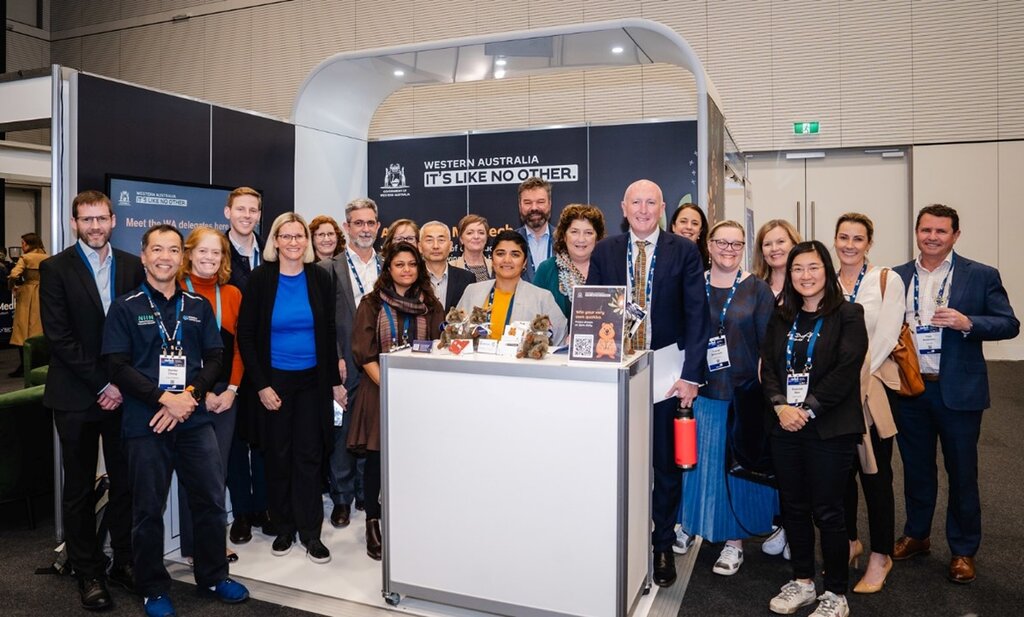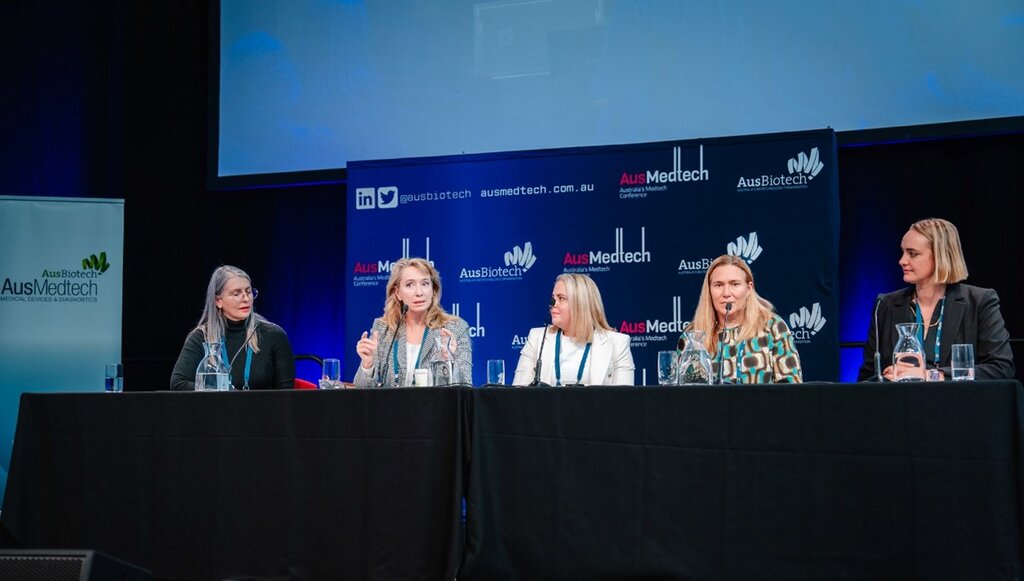Event report
Australia’s biggest week in medtech in Adelaide
AusMedTech 2024, which took place in Adelaide from 22-23 May, centred on the challenges and opportunities for Australian medtechs and the shifting global landscape.

What Women Don’t Want panel Bronwyn Le Grice, Rebecca Wilson, Dr Elaine Stead, Michelle Gallagher. Credit: AusBiotech
The 2024 AusMedtech conference saw discussions around enabling Australia to make major medical technology contributions locally and across the world. This included calls for Australian regulators to support local innovation through supportive policy - leading to easier local market product entry and supporting local sovereign capabilities to help Australian companies enter the local and global markets with innovations.
AusMedtech is Australia’s premier medical technology conference designed to bring the most important topics impacting the industry to centre stage. By bringing together key stakeholders of the Australian and international devices and diagnostics sector, business, decision makers and investors all came together to discuss the necessary steps for the diagnostics sector to adapt to change and prepare the industry for the changing landscape.
Now running for over 17 years, the two-day conference attracted over 450 delegates, the event which included expert panel discussions were delivered by the industry and AusBiotech, presenting engaging and ground-breakingtopics. Experts shared their expertise, insight and commentary on key topics impacting Australia’s sovereign capability, ingenuity, and global growth in the MedTech sector.
Panel discussion topics varied from artificial intelligence (AI), Australian success stories, medical device regulation and partnering with big MedTech, capital markets, making market access a priority for Australian innovators, the importance of ESG in medical technology, issues facing healthcare in Australia what angel investors look for in a MedTech startup and more.
The presence of the South Australia and Western Australia stands were felt in the exhibition hall. South Australia, where the event was held, promoted the Adelaide BioMed City experience and Lot Fourteen walking tours offered to delegates in the state for the conference.
Western Australia positions itself as a MedTech innovator state
Western Australia held an engaging keynote discussion showcasing Western Australia’s MedTech capabilities, chaired by Rosanne Hyland, Chief Operating Officer at AusBiotech, and Hon. Stephen Dawson MLC, Minister Assisting the Minister for State and Industry Development, Jobs and Trade, Western Australia Government. The session highlighted the capability in Western Australia and highlighted local success stories.

Western Australia stand. Credit: AusBiotech
Minister Dawson also contributed to the Making market access a priority for Australian Innovators discussion, which highlighted the key challenge for Australian MedTech companies is the time it takes to get the product to market. Minister Dawson expressed his want to procure Australian products for Western Australia, talking to the importance of breaking down barriers of procurement. This notion was supported by Gibran Maher, CEO of Additive Surgical, who as an Australian medical technology innovator and having experienced the process can attest to the frustration with frequently changing medical device regulations in Australia. The panelists concluded the for sovereign manufacturing and continued innovation to be commercially attractive for companies there needs to be support from the local regulator to speed up access to technology, which is needed by patients, and can offer an alternative to previous methods used for treatment or management of health conditions.
The use of AI in MedTech
Panel discussion Ethics and AI – has the horse already left the stable included expert panelists Daniela Cecere-Palazzo, Senior Lawyer from Youlegal, Angie Corbo, Informatics Global Catalyst Innovation & Architecture from Roche, Liesl Yearsley, CEO & Founder of Akin and Justine Lacey, Director, Responsible Innovation Future Science Platform from CSIRO all contributed to a thought provoking and insightful session.

Ethics and AI panel Daniela Cecere-Palazzo, Angie Corbo, Liesl Yearsley, Justine Lacey and Chaired by Grace Lethlean. Credit: AusBiotech
The panel called for AI to be looked at as an instrument and called for regulators to consider its policies around use of AI in Australia according to consumer law, and to prioritise data privacy.
AI certainly has its benefits, particularly around a use in tasks which typically take cognitive labor to complete. The use of AI in healthcare is seen with computer system validation, clinical trials ethic committees, and can be used for responsible research and responsible innovation. The panel agreed that the view of the public needs to be considered when it comes to AI. Is there a clear benefit to the public in the use of the AI technology? AI creates an opportunity for good if there are clear policies which hold AI technology companies accountable so the use of AI mus5 be transparent.
The conference halls were busy and engaged, with thoughtful questions from participants asked during each panel discussion, with each question a reflection of the eagerness to learn and collaborate working towards a better Australian MedTech industry.
AusMedTech is set to return in 2025 in Sydney, NSW on 7 – 8 May 2025. Be sure to stay tuned for updates and early registration announcements.
As a society, we’re getting older, we’re getting sicker, and we’re driving less.
Kerico chief development officer, Chris Ochs
There has been oversaturation in the market with companies providing a particular kind of limited virtual care as a standalone service. In the US, there was more capacity than demand for that service and that business model.
Total annual production


Caption. Credit:

Phillip Day. Credit: Scotgold Resources